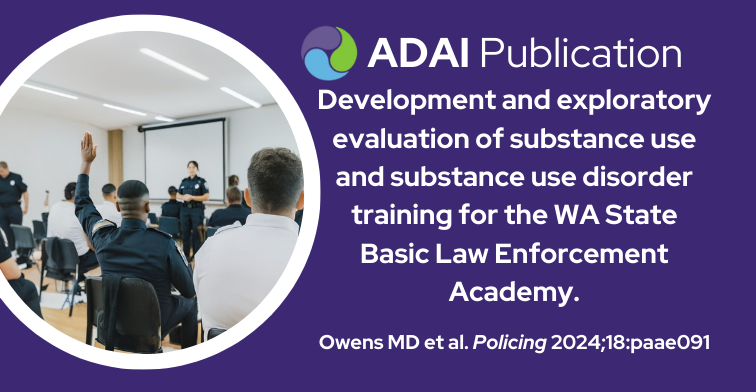New ADAI Publication: Substance Use Disorder Training for WA State Basic Law Enforcement Academy
09/16/2024Citation: Owens MD, et al. Development and exploratory evaluation of substance use and substance use disorder training for the Washington State Basic Law Enforcement Academy. Policing 2024;18:paae091.

In 2021, Washington State passed a law requiring all new law enforcement officers to get training on substance use disorder (SUD), with a goal of improving conflict resolution and treatment referrals for people with SUD.
The Washington State Criminal Justice Training Commission (WSCJTC) was responsible for developing and delivering the training, and the University of Washington, including ADAI Assistant Professor Mandy Owens, PhD, collaborated in the process.
This new article in the journal Policing, written by Dr. Owens and colleagues, describes the development of the new substance use training for police recruits, as well as the evaluation process, which compared recruits who did and did not receive the training on their 1) knowledge of alcohol and drugs and 2) confidence in interacting with people who use alcohol and drugs.
The training included both evidence-based information (e.g. SUD signs and symptoms, risk factors, the role of trauma) and diverse perspectives from people who have lived and living experience of SUD. It was also relatively short (four hours) and able to be delivered in a two-hour online version, making it fairly easy for other states’ training programs to deliver it.
Recruits completed a survey before and after receiving the training to measure their “pre-” and “post-” training knowledge of alcohol and drugs and professional self-esteem in working with people who have SUD.
Analysis of the survey results found that recruits (n=211) who received the new training reported increases in almost all questions of knowledge and professional self-esteem, while recruits who did not receive the training reported little or no changes.
This study demonstrated that the training was effective and easy to deliver. It also uses an evaluation plan that’s feasible and can be replicated without much funding. Training for law enforcement on these subjects can help officers better respond to overdose, improve their empathy for people who use drugs and alcohol, and teach them actionable skills that can make them feel more confident in their roles.
Need help getting a copy? Contact Meg Brunner: meganw@uw.edu.





